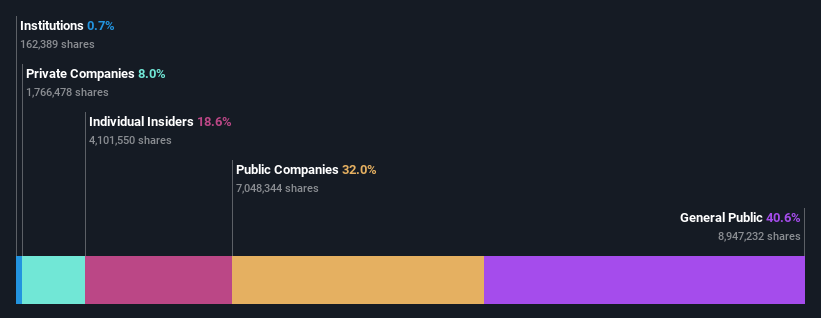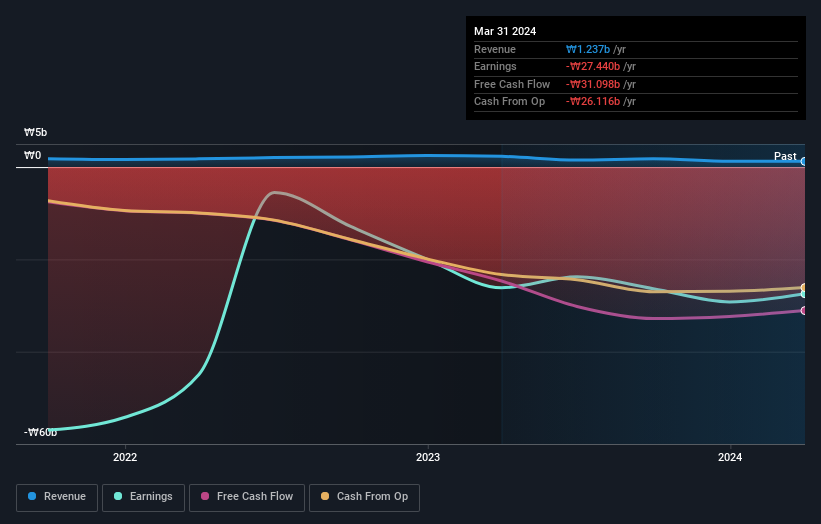Stock Analysis
- South Korea
- /
- Biotech
- /
- KOSDAQ:A203400
Individual investors invested in ABION Inc. (KOSDAQ:203400) copped the brunt of last week's ₩1.8b market cap decline

Key Insights
- Significant control over ABION by individual investors implies that the general public has more power to influence management and governance-related decisions
- A total of 3 investors have a majority stake in the company with 50% ownership
- 17% of ABION is held by insiders
To get a sense of who is truly in control of ABION Inc. (KOSDAQ:203400), it is important to understand the ownership structure of the business. With 37% stake, individual investors possess the maximum shares in the company. In other words, the group stands to gain the most (or lose the most) from their investment into the company.
As market cap fell to ₩243b last week, individual investors would have faced the highest losses than any other shareholder groups of the company.
In the chart below, we zoom in on the different ownership groups of ABION.
See our latest analysis for ABION

What Does The Lack Of Institutional Ownership Tell Us About ABION?
Small companies that are not very actively traded often lack institutional investors, but it's less common to see large companies without them.
There could be various reasons why no institutions own shares in a company. Typically, small, newly listed companies don't attract much attention from fund managers, because it would not be possible for large fund managers to build a meaningful position in the company. On the other hand, it's always possible that professional investors are avoiding a company because they don't think it's the best place for their money. ABION might not have the sort of past performance institutions are looking for, or perhaps they simply have not studied the business closely.

ABION is not owned by hedge funds. The company's largest shareholder is TELCON RF PHARMACEUTICAL. Inc., with ownership of 32%. Young-Gi Shin is the second largest shareholder owning 11% of common stock, and Youngho Choi holds about 7.6% of the company stock. Young-Gi Shin, who is the second-largest shareholder, also happens to hold the title of Chief Executive Officer.
To make our study more interesting, we found that the top 3 shareholders have a majority ownership in the company, meaning that they are powerful enough to influence the decisions of the company.
While studying institutional ownership for a company can add value to your research, it is also a good practice to research analyst recommendations to get a deeper understand of a stock's expected performance. We're not picking up on any analyst coverage of the stock at the moment, so the company is unlikely to be widely held.
Insider Ownership Of ABION
The definition of company insiders can be subjective and does vary between jurisdictions. Our data reflects individual insiders, capturing board members at the very least. The company management answer to the board and the latter should represent the interests of shareholders. Notably, sometimes top-level managers are on the board themselves.
I generally consider insider ownership to be a good thing. However, on some occasions it makes it more difficult for other shareholders to hold the board accountable for decisions.
Our most recent data indicates that insiders own a reasonable proportion of ABION Inc.. It has a market capitalization of just ₩243b, and insiders have ₩41b worth of shares in their own names. It is great to see insiders so invested in the business. It might be worth checking if those insiders have been buying recently.
General Public Ownership
The general public-- including retail investors -- own 37% stake in the company, and hence can't easily be ignored. This size of ownership, while considerable, may not be enough to change company policy if the decision is not in sync with other large shareholders.
Private Company Ownership
We can see that Private Companies own 7.3%, of the shares on issue. It might be worth looking deeper into this. If related parties, such as insiders, have an interest in one of these private companies, that should be disclosed in the annual report. Private companies may also have a strategic interest in the company.
Public Company Ownership
Public companies currently own 29% of ABION stock. We can't be certain but it is quite possible this is a strategic stake. The businesses may be similar, or work together.
Next Steps:
It's always worth thinking about the different groups who own shares in a company. But to understand ABION better, we need to consider many other factors. Take risks for example - ABION has 3 warning signs (and 2 which shouldn't be ignored) we think you should know about.
Of course this may not be the best stock to buy. Therefore, you may wish to see our free collection of interesting prospects boasting favorable financials.
NB: Figures in this article are calculated using data from the last twelve months, which refer to the 12-month period ending on the last date of the month the financial statement is dated. This may not be consistent with full year annual report figures.
Valuation is complex, but we're helping make it simple.
Find out whether ABION is potentially over or undervalued by checking out our comprehensive analysis, which includes fair value estimates, risks and warnings, dividends, insider transactions and financial health.
View the Free AnalysisHave feedback on this article? Concerned about the content? Get in touch with us directly. Alternatively, email editorial-team (at) simplywallst.com.
This article by Simply Wall St is general in nature. We provide commentary based on historical data and analyst forecasts only using an unbiased methodology and our articles are not intended to be financial advice. It does not constitute a recommendation to buy or sell any stock, and does not take account of your objectives, or your financial situation. We aim to bring you long-term focused analysis driven by fundamental data. Note that our analysis may not factor in the latest price-sensitive company announcements or qualitative material. Simply Wall St has no position in any stocks mentioned.
Valuation is complex, but we're helping make it simple.
Find out whether ABION is potentially over or undervalued by checking out our comprehensive analysis, which includes fair value estimates, risks and warnings, dividends, insider transactions and financial health.
View the Free AnalysisHave feedback on this article? Concerned about the content? Get in touch with us directly. Alternatively, email editorial-team@simplywallst.com
About KOSDAQ:A203400
ABION
Operates as a pharmaceutical biotech Company in South Korea and internationally.
Imperfect balance sheet with weak fundamentals.

